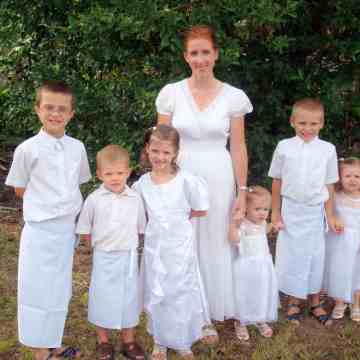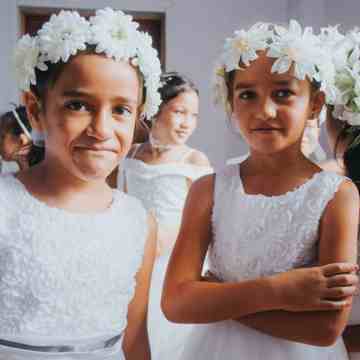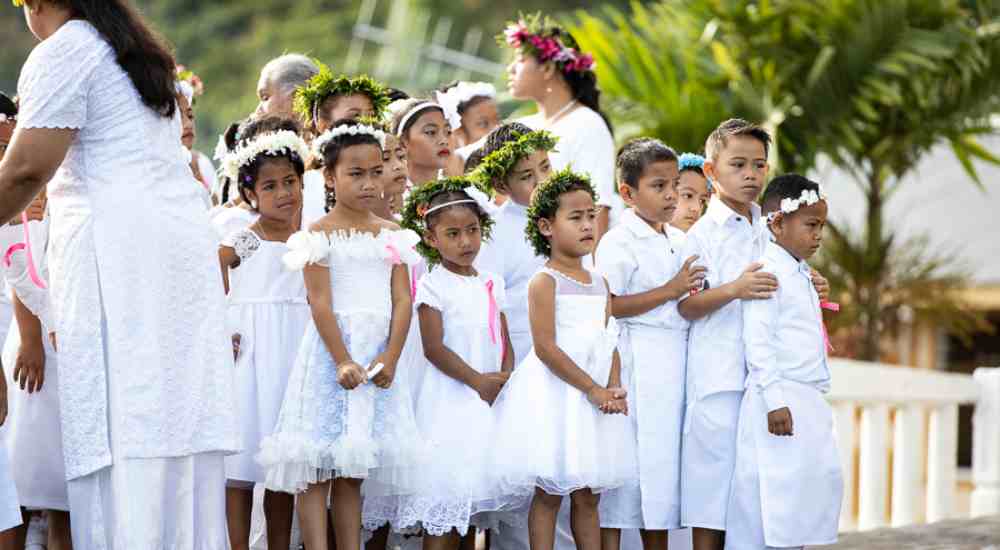In the heart of the South Pacific, nestled among the azure waters and lush landscapes of Samoa, lies a cherished national holiday that resonates with profound cultural significance. White Sunday, known in the Samoan language as Lotu Tamaiti or “Children’s Service,” is a day that holds a special place in the hearts of Samoan families and communities. Celebrated on the second Sunday of October, this unique occasion is more than just a holiday; it’s a joyous ode to childhood and a testament to the strength of community bonds.
While White Sunday has its roots in Christianity and was introduced by missionaries in the 19th century, it has evolved over the years into a vibrant and cherished tradition. It’s a day when the entire nation comes together to acknowledge and celebrate the most precious members of their society: the children. On this day, the picturesque islands of Samoa are painted in white, as children and their families don pristine white attire to mark the occasion.
But White Sunday is not just about dressing up. It’s about giving children a stage to shine, to display their talents, and to feel cherished and valued by their families and communities. It’s a day of creative performances, scriptural recitations, and heartfelt church services. It’s a day when children receive gifts, indulge in their favorite foods, and enjoy privileges typically reserved for their elders. It’s a day that fosters unity, love, and the enduring spirit of Samoan culture.
In this exploration of White Sunday, we will delve into its rich history, the captivating traditions that define it, and the cultural tapestry that makes it a unique and cherished holiday in Samoa. Join us as we unravel the essence of White Sunday, a day that celebrates the magic of childhood and the strength of community bonds in the heart of the Pacific.
History of White Sunday
The origins of White Sunday, the beloved Samoan holiday celebrating childhood and community, can be traced back to the influence of Christian missionaries in the 19th century. These early Christian pioneers arrived on the pristine shores of Samoa, bringing with them their faith, values, and the seeds of a tradition that would grow into something uniquely Samoan.

The first White Sunday was celebrated in June 1898, a pivotal moment in the history of Samoa. It was during this year that the London Missionary Society (LMS) made a significant decision during its annual conference. The LMS, recognizing the importance of children and the need to emphasize their role in the church and community, established a special Sunday dedicated to the young members of their congregations. This inaugural White Sunday was celebrated in all LMS churches in Samoa, marking the birth of a tradition that would soon envelop the entire nation.
However, the holiday underwent an evolution over the years. In February 1909, during the International Sunday School Conference held in Rome, a decision was made to designate the third Sunday of October as the International Children’s Sunday. As a result, the Samoan White Sunday was moved from its original date in June to the third Sunday of October, aligning it with the international celebration of children.
Yet, this date didn’t remain unchanged. It was eventually moved to its current position on the second Sunday of October. This decision was made to harmonize White Sunday with other similar celebrations, such as Mother’s Day on the second Sunday in May and Father’s Day on the second Sunday in August. This adjustment ensured that these important family-oriented celebrations were evenly spaced throughout the year.
The origins of White Sunday, however, remain a topic of fascination and debate. Various theories have emerged over the years, each contributing to the tapestry of this cherished holiday. Some believe that White Sunday is a Christian adaptation of an indigenous pre-contact celebration, possibly linked to specific planting and harvesting seasons—a testament to the cultural blending that often characterizes traditions. Others assert that the holiday’s roots run deep into the tragic pages of history, stemming from the influenza epidemic of 1918.

This devastating pandemic, introduced to Samoa through the complexities of New Zealand colonial administration, claimed the lives of a significant portion of the Samoan population, including many children. In this view, White Sunday serves as a somber yet poignant remembrance of those who succumbed to the virus.
These theories, each carrying its own weight of historical significance, add layers of complexity and depth to the story of White Sunday. They reflect the fluid nature of traditions and the profound impact of historical events on the shaping of cultural practices.
White Sunday Traditions
White Sunday in Samoa is not just a date on the calendar; it’s a tapestry of traditions that weaves together faith, family, and community. This cherished holiday is marked by a set of rituals and customs that give it its unique character.
1. Special Church Programs: The heart of White Sunday lies in the special church programs hosted across Samoa and neighboring nations. These programs are meticulously prepared, often with months of practice leading up to the big day. Children are the stars of the show, showcasing their talents in various creative performances. From melodious songs to intricate dance routines and even theatrical skits, White Sunday offers young Samoans the opportunity to shine before their families and communities. The church services themselves are filled with scriptural recitations and biblical story reenactments, emphasizing the Christian values at the core of this celebration.
2. Dressing in White: On White Sunday, the entire nation comes together in a sea of white attire. Women and children don their finest white clothing, often trimmed with the other two colors of the Samoan flag: red and blue. Men, on the other hand, wear white shirts with either white slacks or the traditional ‘ie faitaga, a form of lavalava, which need not necessarily be white. This collective attire symbolizes purity, unity, and the equality of all in the eyes of the community and the church.
3. Symbolism of Red and Blue: The addition of red and blue accents to the white attire is not coincidental. These colors hold deep significance, representing the colors of the Samoan flag. Red symbolizes courage and blue stands for freedom. By incorporating these colors into their clothing, Samoans pay homage to their cultural identity and the values that have shaped their nation.
4. Privileges for Children: White Sunday is a day when children are elevated to a special status within their families. They are granted privileges that are typically reserved for their elders. One of the most notable privileges is being served first during family meal times—a small but significant gesture that underscores the importance of children within the family unit. Moreover, children receive gifts, often in the form of new clothing or school supplies. These gifts serve not only as tokens of affection but also as practical necessities for the upcoming school year. It’s a day when children are showered with love and attention from family members and older friends.
White Sunday Timeline
The history of White Sunday in Samoa is a fascinating journey, marked by key events that have shaped this cherished holiday and its significance. Here is a concise timeline of significant events related to White Sunday:
19th Century – Arrival of Missionaries: Christian missionaries arrived in Samoa during the 19th century, bringing their faith, values, and traditions to the islands.
1898 – Birth of White Sunday: The London Missionary Society (LMS) plays a pivotal role by establishing a special Sunday for children during its annual conference. This marks the birth of White Sunday. The first White Sunday was celebrated in June 1898 in all LMS churches in Samoa, emphasizing the importance of children within the church and the community.
1909 – International Children’s Sunday: During the International Sunday School Conference held in Rome in February 1909, it was decided to name the third Sunday of October as the International Children’s Sunday. White Sunday in Samoa is moved from its original date in June to align with the international celebration of children.
Second Sunday of October: The date of White Sunday was eventually settled on the second Sunday of October, a position it still holds today. This move allows White Sunday to coincide with other family-oriented celebrations such as Mother’s Day and Father’s Day, which fall on the second Sundays of May and August, respectively.
1998 – Expansion Beyond Samoa: White Sunday expands its reach beyond Samoa, becoming a national holiday in six other countries in 1998. These countries include the United States, Hawaii, New Zealand, Australia, and American Samoa. The centenary of White Sunday was celebrated in 1998 not only in Samoan churches but also in CCCS churches in various parts of the world, signifying its growing importance and global significance.
White Sunday Activities
White Sunday is a day filled with joy, spirituality, and vibrant celebrations in Samoa. The activities that take place on this special occasion reflect the deep cultural and religious significance of the holiday. Here’s a detailed look at the key activities associated with White Sunday:
1. Special Church Services: White Sunday begins with congregations across Samoa attending church services that are dedicated to children. These services are a central part of the celebration, providing a platform for children to actively participate and display their talents. The atmosphere is one of reverence and excitement as families come together in their finest white attire to worship and celebrate.
2. Creative Performances: During these church services, children take center stage. They present a wide range of creative performances that have been rehearsed for weeks or even months leading up to White Sunday. These performances include melodious songs, intricate dance routines, and even skits that often depict biblical stories or important moral lessons. The church reverberates with the enthusiasm and energy of the young performers.
3. Dress Code: Dressing in white is a significant tradition on White Sunday. Women and children adorn themselves in elegant white clothing, sometimes complemented by red and blue accents to represent the colors of the Samoan flag. The attire symbolizes purity, unity, and the equality of all participants in the eyes of the community and the church. Men typically wear white shirts, and some opt for white slacks or the traditional ‘ie faitaga, a form of lavalava.
4. Special Meals: After church services, families come together to share meals in a spirit of unity and love. White Sunday is an occasion when children are treated to their favorite foods, and it’s common for households to prepare special dishes that the young ones enjoy. This act of indulgence and love reinforces the bonds within the family and creates lasting memories.
5. Gift-giving: Children are showered with gifts on White Sunday, a gesture that signifies affection and appreciation. These gifts often include new clothing, school supplies, toys, and other tokens of love. It’s a day when children feel truly cherished and valued within their families and communities.
6. Communal Unity: White Sunday promotes communal unity as every child from every family participates in the festivities. It’s a time when neighborhoods come together, and communities strengthen their bonds through shared celebrations and support.
Cultural Insights
Samoan culture is a rich tapestry of traditions, values, and unique elements that have shaped the identity of this vibrant Pacific nation. Here are some fascinating cultural insights about Samoa:
1. High Christian Population
Approximately 98% of Samoans are Christians, making Christianity a central aspect of Samoan life. This strong Christian influence is reflected in the significance of White Sunday and other religious celebrations in the country.
2. Impressive Forestation
Samoa boasts remarkable natural beauty, with approximately 60% of the country covered in lush forests. The stunning landscapes, dense rainforests, and diverse flora and fauna contribute to Samoa’s ecological diversity and attract nature enthusiasts from around the world.
3. Notable Samoan Individuals
Samoa has produced notable individuals who have achieved international acclaim. One such individual is Dwayne “The Rock” Johnson, the former professional wrestler turned Hollywood superstar. Johnson, with his Samoan heritage, has become an iconic figure, inspiring pride among Samoans and showcasing the global reach of Samoan talent.
4. Cultural Significance of Tattoos (Tatau)
Tattoos, known as “Tatau,” hold immense cultural significance in Samoan tradition. Tatau is not merely body art; it is a symbol of Samoan spirituality and heritage. Tattoos are often worn with pride, representing one’s life journey, family history, and personal achievements. The process of receiving a Tatau is a rite of passage and a profound cultural experience.
5. Traditional Garment – “Lavalava”
The “lavalava” is a traditional Samoan garment that is worn by both men and women. It is essentially a rectangular piece of cloth that can be wrapped and secured around the waist to form a skirt-like garment. The lavalava is versatile and worn on various occasions, from everyday life to special celebrations. It is a symbol of Samoan identity and cultural heritage, often adorned with intricate patterns and designs.
Why We Love White Sunday
White Sunday is more than just a date on the calendar; it’s a day that resonates with profound positive aspects, deeply ingrained in the hearts of the Samoan people. Here are some of the reasons why White Sunday is cherished and celebrated with enthusiasm:
1. Showcasing Talents and Fostering Development
White Sunday provides a unique platform for children to shine and showcase their talents. Through creative performances during church services, young Samoans have the opportunity to express themselves through music, dance, and drama. This exposure not only builds their self-confidence but also fosters personal development. Many well-known Samoan entertainers and performers credit their ability to speak and act in public to their White Sunday experiences as children. The years of hard work and practice contribute to their development into skilled orators and performers in their adulthood.
2. Joy and Fun for Kids
For children, White Sunday is a day of pure joy and delight. All they have to do on this special children’s day in Samoa is dress up in their best white apparel and get spoiled all day long with food, toys, and affection. The anticipation of receiving gifts and enjoying their favorite foods fills the air with excitement and happiness. It’s a day when the laughter of children echoes throughout the villages, and their smiles light up every corner.
3. Promoting Unity
White Sunday is a celebration that goes beyond individual families; it promotes unity within families and communities. Families come together to prepare and celebrate the holiday, strengthening their bonds. Neighbors, friends, and community members join in the festivities, creating a sense of togetherness that transcends the day itself. White Sunday fosters a spirit of communal unity, where everyone comes together to honor and support the children, emphasizing the importance of family and community ties.
Conclusion
In the heart of the Pacific, on the picturesque islands of Samoa, White Sunday stands as a beacon of significance, celebrating the essence of childhood, culture, and community bonds. This cherished holiday, with its deep-rooted traditions and vibrant festivities, holds a special place in the hearts of Samoans, embodying values that are at the core of their identity.
White Sunday’s importance lies in its ability to honor and uplift the youngest members of Samoan society. It provides a stage for children to showcase their talents, fosters their personal growth, and instills in them a sense of self-confidence that will shape their futures. Through creative performances and church services, White Sunday reinforces the idea that every child is valued, cherished, and encouraged to reach their full potential.
Moreover, White Sunday is a testament to the enduring cultural heritage of Samoa. It connects the present generation to their ancestors, emphasizing the significance of traditional attire, such as the lavalava, and practices like Tatau, the art of tattooing. The holiday also reflects the strong Christian faith that is deeply ingrained in Samoan life, fostering a sense of spirituality and devotion.
Beyond the individual family celebrations, White Sunday strengthens the bonds within communities. It is a day when neighborhoods come together, when friends and neighbors join in the festivities, and when unity and togetherness are celebrated as cornerstones of Samoan culture. In this collective spirit, the significance of family and community ties is reaffirmed, and a sense of belonging is nurtured.
As we conclude this exploration of White Sunday, we invite you to not only appreciate the rich traditions of this holiday but also to participate in its celebrations. Whether you find yourself in Samoa or are inspired to incorporate elements of White Sunday into your own culture, the essence of this cherished day transcends borders and invites all to celebrate the joy of childhood, the strength of cultural identity, and the power of community bonds. In embracing the spirit of White Sunday, we join Samoans in celebrating the magic of this unique and beloved holiday.
You Can Also Checkout Other Holidays:
- The Battle Of Angamos: Date, History, Significance, Timeline, Facts, October 8
- American Touch Tag Day: Date, History, Significance, Timeline, Facts, October 8
- Simchat Torah: Significance, History, Customs, Traditions, Celebration, October 8
- Albuquerque International Balloon Fiesta: History, Timeline, Significance, October 7

